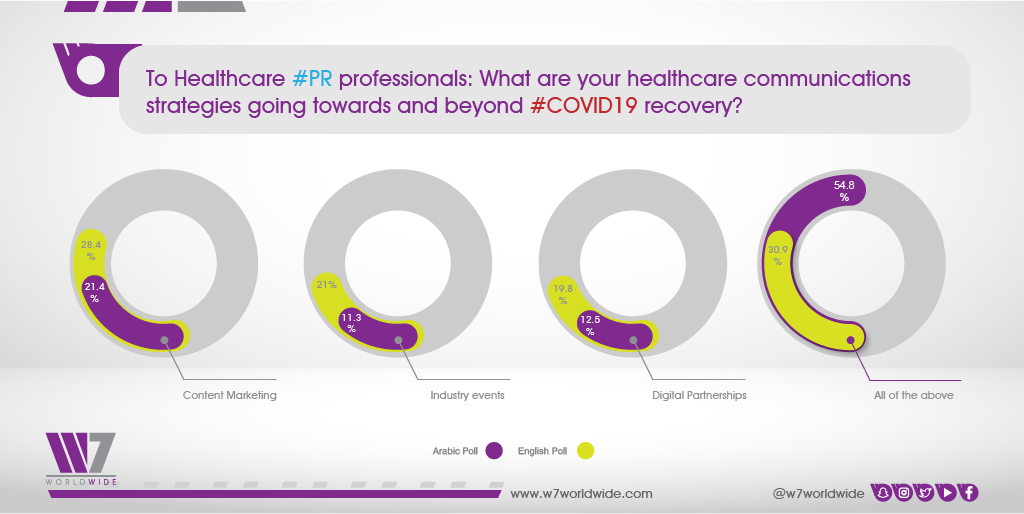
While the pandemic continues to disrupt businesses and organizations in all sectors, companies have started to think beyond COVID-19, and rightly so, turning their focus to emerging out of the crisis and reshaping the industry.
The COVID-10 pandemic has drawn a lot of attention to the health care sector, for better or for worse. In a post-crisis world, the dynamic and highly competitive world of health care demands specific PR and communication strategies to navigate the new and evolving industry landscape.
W7Worldwide’s recent Twitter poll attempted to spotlight the best health care communication strategies going toward and beyond COVID-19. Of the 641 participating PR professionals, 28.4% in the English poll and 21.4% in the Arabic poll chose “Content Marketing” as the most powerful health care communication strategy of the four given options. About 21 percent of those polled in English and 11.3% polled in Arabic picked “Industry Events,” while 19.8% English voters and 12.5% Arabic voters chose “Digital Partnership”. The majority of those polled, 30.9% in English and 54.8% in Arabic, said they would do “All of the Above.”
Content Marketing
Most consumers, especially in the midst of a global pandemic, use the Internet to search and find health content online. Although there is no dearth of information on all sorts of symptoms, diagnoses and treatments on the web, a lot of this content is incorrect, contradictory or promotional. Health care companies should seek to spread awareness via original and timely stories, complete with expert quotes and a video or two featuring the expert/ doctor. The aim is to build an audience and a trustworthy relationship with them. While health care brands are not expected to pursue serious journalistic stories, they can simply report and comment on the developments taking place in the industry. The idea is to use trending topics to provide insights and analysis that the public cannot get elsewhere.
Industry Events
Health care conferences and forums bring together the best minds in health care and related fields, helping to build connections, learn about the latest trends, access new opportunities, and educate the public. Such events – whether in-person or online – provide an insight into the complex world of health and well-being, with business leaders and innovators discussing the challenges, achievements, best practices and strategies to more rapidly and effectively improve community health. Health care companies can use these events to stay in the news and spread awareness among the public. However, before you announce the next medical seminar or symposium, make sure you have a clear idea about what your event objective is, and what you intend to gain from it and how.
Digital Partnership
Technology has a huge role to play in enabling everyone to receive health care. Digital health can improve people’s lives by increasing their access to health care services and information. The pandemic proved that companies that embraced digital transformation have an edge over the rest. In health care too, digital-first companies offering telemedicine and health tech are enjoying significant popularity. In fact, many health care companies launched e-doctor consultation and prescription services during and after the lockdown to facilitate those seeking medical help without leaving the house. Supporting and partnering with the government, public and private organizations, pharma companies and health insurers, is an important step toward providing effective health care to the community.

